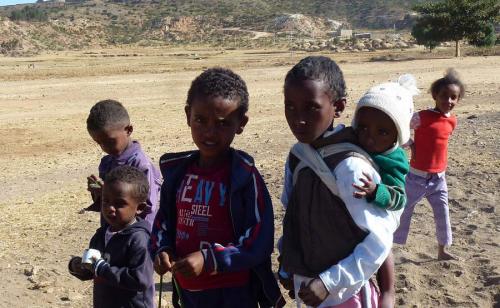Independent UN expert stresses need to improve human rights situation in Eritrea
The international community must keep Eritrea under “close scrutiny”, an independent United Nations expert said Tuesday, stressing the need to fundamentally transform the East African nation’s “current culture of rights denial.”

Children in the town of Embetyo, Eritrea.
“Blatant disrespect for human rights in Eritrea is unacceptable,” said Sheila Keetharuth, the Special Rapporteur on the human rights situation in Eritrea, after a 10-day mission to Ethiopia and Djibouti to collect first-hand information directly from Eritrean refugees on the human rights situation in their country.
“Real change would require a fundamental reform process transforming the current culture of rights denial with one anchored in the rule of law, respect for and realization of all human rights and human dignity.”
A lawyer from Mauritius, Ms. Keetharuth was appointed to her current position by the Geneva-based UN Human Rights Council in September 2012.
She warned in a news release that the high numbers of Eritrean refugees in neighbouring Ethiopia and Djibouti is “indicative of the serious human rights violations in Eritrea, pushing people to take the difficult decision to leave their families and homes behind for an unknown future.”
“An improvement in the human rights situation in Eritrea will be crucial to allow refugees to return to their home country,” Ms. Keetharuth noted, while commending the efforts by Ethiopia and Djibouti to host the large Eritrean refugee communities.
“Many of those refugees I spoke to underlined their wish to return, should there be a significant shift from the Government’s current brutal and inhumane policies and practices.”
Since the beginning of the year, close to 4,000 Eritrean refugees have crossed the border into Ethiopia, bringing the number of those living in the three refugee camps in the Tigray region to over 50,000.
“I am particularly concerned about the increasing number of unaccompanied children crossing the border without the knowledge of their families,” Ms. Keetharuth said. “Children regularly mentioned dysfunctional family circumstances due to the long absence of the father, most of the time because of conscription, lack of educational opportunities and the fear of forced conscription into indefinite national service as major reasons for their decisions to flee.”
The Special Rapporteur voiced particular concern about the indefinite national service, the ongoing practice of arbitrary arrest and incommunicado detention in inhumane conditions and widespread torture, both physical and psychological, during interrogation by the police, military and security forces. Mere suspicion appears to be enough for somebody to be subjected to interrogation and detention without charge or without being brought before a court of law.
Ms. Keetharuth heard how Eritreans do not express their views or share their opinions openly for fear of reprisals. “Persecution on religious grounds continued in Eritrea; followers of unrecognised religions face draconian restrictions and are often arrested while worshipping,” she said.
“An all-encompassing feeling of fear and distrust, even within families, reflects the pervasive intelligence network the Eritrean Government has established throughout the country.”
Independent experts, or special rapporteurs, work in an unpaid capacity to examine and report to the Human Rights Council on a country situation or a specific human rights theme. Ms. Keetharuth will present her first report, which would be strictly limited to the situation inside Eritrea, to the Council in June 2013.
Source: UN News
- 416 reads
Human Rights
Ringing FOWPAL’s Peace Bell for the World:Nobel Peace Prize Laureates’ Visions and Actions

Protecting the World’s Cultural Diversity for a Sustainable Future

The Peace Bell Resonates at the 27th Eurasian Economic Summit

Declaration of World Day of the Power of Hope Endorsed by People in 158 Nations

Puppet Show I International Friendship Day 2020

